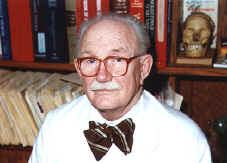 He is one of these open persons, not apt to cover up in
conversation. he talks straight out, not blunt but matter of fact, and is a
likeable young man, more of a chess player than a jock, an intellectual.
He is one of these open persons, not apt to cover up in
conversation. he talks straight out, not blunt but matter of fact, and is a
likeable young man, more of a chess player than a jock, an intellectual.
They Write About Us.
The text of the article is reprinted with the written permission of The Editorial Board of The Anderson Independent-Mail.
All Rights Reserved (c) 2001.
To view the scanned image of the article click here.
Anderson Independent-Mail, Sunday, Jan. 21, 2001.
Foreign student's take on America
by Dr. William Hunter
He is young with a
sharp face, intelligent eyes alertly sizing up the
situation, all of which can't conceal a penetrating curiosity. He is one of these open persons, not apt to cover up in
conversation. he talks straight out, not blunt but matter of fact, and is a
likeable young man, more of a chess player than a jock, an intellectual.
He is one of these open persons, not apt to cover up in
conversation. he talks straight out, not blunt but matter of fact, and is a
likeable young man, more of a chess player than a jock, an intellectual.
Eugene is an only child. His mother is Russian and his father from Ukraine, where he was born and reared. Eugene is an assumed American moniker to take the place of an unpronounceable Slavic name while he's here in the United States. Since there were five Eugenes in my immediate Hunter family we struck up a conversation.
Dr. William Hunter
At 23 he was a professor of world literature in the Ukraine where he also teaches German and English. I immediately asked who his favorite Russian authors were and when he said Tolstoy, Checkov, and Dostoevsdy I knew I was going to like this fellow; the three are also favorites of mine. But, he went on to say, these writers aren't necessarily the most popular at present in his country.
He was one of 7,000 people who took an examination for 150 places to come to the United States and study for a year. Five of the 150 are at Clemson University; the other four are females. Eugene is studying political science.
I explained to him that the parts of the old Soviet Union that is Russia and Ukraine were little differentiated by most Americans. He smiled in agreement and explained a big difference as he saw it. "They have a different language and when I cross the border between Ukraine and Russia I immediately feel the difference of space. Russia gives you the feeling of wide spaces and openness while Ukraine is more compact."
His early contacts with Christian missionaries (Baptist), as a translator at their summer camp for children in Ukraine was his initial step to ending up here in the United States.
Eugene is disappointed in American Students' approach to education. He was also disappointed in the morals he found here. "Students in Ukraine are oriented more to education and maybe a third of the students here are on drugs or smoking something illegal." This surprised me and when I questioned these figures he said, "I'm not really sure on such a percentage but I know it's very high."
When I told him I had a son, Samuel, who belonged to the Orthodox Church, as in Russian Orthodox, he seemed amazed. He didn't hesitate to talk about his own religious beliefs, saying, " I believe in God and I like the part of the teaching of Jesus wherein he says if someone strikes you on the cheek then also let him strike you on the other cheek. But you know, the Christians here don't believe in this. They all have their denominations and many of them don't get along, which to my mind separates them from God."
Eugene talked about the racial problem here and elsewhere. He had a Russian-Jewish girlfriend who moved to Israel. He visited her there and felt there was discrimination between Jews and Palestinians. "Everything (in America) is supposed to be free of racial prejudice but I notice in the university dining areas that the blacks eat together and the whites eat together."
By this time we were finishing desert. He finally pushed it away half eaten, saying. "Everything here is excessive."
William Hunter is a Clemson physician and chairman of Clemson University's Calhoun Lecture Series.
Home Course Discripition Distant Learning Studying Materials